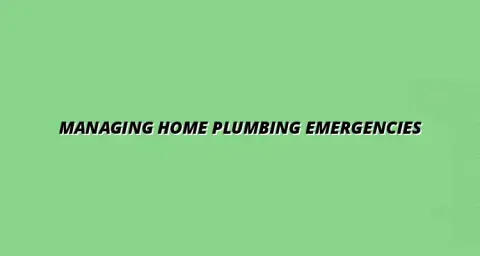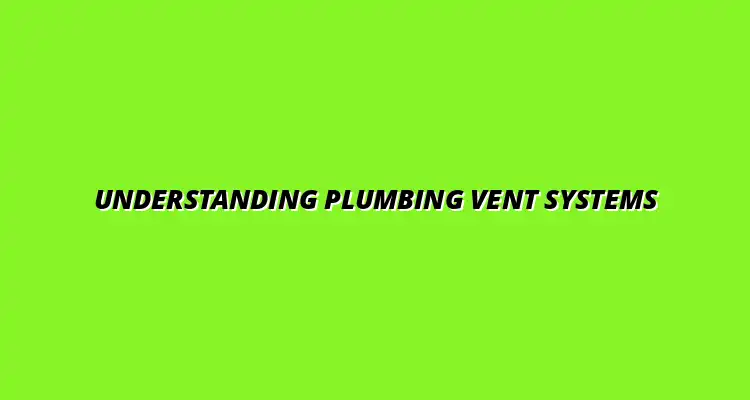
- Plumbing Basics
- Feb 02
2025-01-01
Plumbing vent systems might not be the first thing that comes to mind when you think about home maintenance, but understanding them is crucial! These systems play a vital role in keeping our plumbing functioning efficiently and safely. By learning the essentials of plumbing vent systems, you can ensure your home remains healthy and comfortable. For a broader understanding of how your entire residential plumbing system works, check out this helpful guide on understanding residential plumbing systems.
At its core, a plumbing vent system helps manage air pressure in your plumbing. Without it, you could face some serious problems, such as slow drains or even nasty sewer gas entering your home. Understanding how these systems work is the first step in maintaining a safe living environment.
So, why do we need plumbing vent systems? The primary purposes can be grouped into a couple of key areas, which I'll break down for you here!
One of the main functions of a plumbing vent system is to ensure proper drainage. When you flush a toilet or run water down a sink, air needs to flow freely through the pipes. If it can't, you might experience slow drains or clogs, which can be both inconvenient and messy! If you're experiencing slow drains, you might want to try some natural solutions before calling a plumber. Learn how to unclog your drain naturally here.
Proper venting helps to equalize air pressure in the plumbing system, preventing any potential vacuum or back pressure. This means that waste can move easily without any interruptions, keeping your plumbing working smoothly.
Another critical role of plumbing vent systems is to prevent sewer gases from entering your home. These gases are not only unpleasant but can also be dangerous. The venting system pushes these gases out into the atmosphere, keeping your indoor air safe!
Without a proper vent system, these gases may leak into your home, leading to health risks. That's why it's important to ensure your plumbing vent is functioning properly to maintain a clean and healthy living environment.
To understand how plumbing vent systems work, it's essential to know what they're made of. Here are some key components:
Vent pipes come in various materials and sizes, depending on the plumbing system's design. Common materials include PVC, ABS, and cast iron. Each material has its pros and cons, so it's essential to choose the right one for your specific needs!
The size of the vent pipe matters, too! If the pipe is too small, it won’t allow enough air to flow, which can cause drainage issues. Ensuring that you have the right material and size is key to a well-functioning plumbing vent system. Proper bathroom drain maintenance is also crucial for preventing clogs and ensuring smooth drainage. Check out these bathroom drain maintenance tips.
There are primarily two venting methods: traditional vents and air admittance valves (AAVs). Traditional vents extend through the roof and allow air to flow freely in and out of the plumbing system. On the other hand, AAVs are installed within the building and open only when pressure changes occur.
Both methods have their benefits. Traditional vents provide excellent air circulation, while AAVs can save space and are easier to install. Understanding the differences can help you make informed choices about your plumbing setup. For example, ensuring your kitchen faucet is properly installed can prevent leaks and other plumbing issues. Learn how to install your kitchen faucet easily.
When it comes to plumbing ventilation, many homeowners have questions. Understanding the common queries can help ensure that your plumbing system runs smoothly. Let's dive into some of the most frequently asked questions and provide clear answers.
A blocked plumbing vent can lead to several unpleasant issues in your home. The vent serves as a crucial pathway for air, and when it’s obstructed, it prevents proper drainage and can even cause backups. Understanding the consequences of a blocked vent is essential for maintaining your plumbing system!
Blocked vents can expose you and your family to serious health risks. Here are some potential dangers:
Detecting a blocked vent early can prevent bigger issues down the line. Watch out for these signs:
Yes, plumbing vent systems are generally required by building codes across different regions. These codes ensure that plumbing systems are safe and function correctly. Understanding these regulations can help you make informed decisions about your plumbing design! If you need plumbing services in Billesley, Birmingham, you can find a local plumber here.
Compliance with local plumbing codes is vital for several reasons:
Building codes set specific standards for plumbing vent design, ensuring protection and efficiency. These codes address:
Understanding plumbing vent systems is crucial for maintaining a healthy home. Taking the time to address these common questions can help you avoid costly repairs and ensure your plumbing functions optimally! Regular maintenance, like checking your gas water heater, is key to preventing problems. Learn how to maintain your gas water heater.
Regular maintenance of your plumbing vent system is key to keeping everything running smoothly. It’s not just about fixing problems when they arise — proactive care can prevent them!
Here are some tips to keep your plumbing vent system in top shape:
Investing time in maintaining your plumbing vent system provides long-term advantages:
As homeowners, understanding the significance of safe plumbing practices is crucial. Educating ourselves can help protect our homes and loved ones. Identifying common plumbing problems early can save you time and money. Learn how to identify common plumbing problems.
Homeowners should familiarize themselves with the basics of plumbing venting. Knowing what to look for and how to maintain your system can make a significant difference.
Here are some excellent resources to help you learn more about plumbing vent systems:
